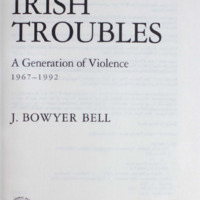-
Title
-
The Irish troubles : a generation of violence, 1967-1992
-
Description
-
History of the conflict that has made the term "Northern Ireland" synonymous with bloodshed and disorder for the past quarter century.
-
Identifier
-
465202
-
312088272
-
Creator
-
Bell, J Bowyer
-
Format
-
1st ed.
-
Source
-
Brian Lamb Booknotes Collection
-
Gift of Brian Lamb, 2011.
-
Catalog record
-
Language
-
eng
-
Date
-
1993
-
Program air date: June 6, 1993.
-
Publisher
-
St. Martin's Press
-
George Mason University. Libraries. Special Collections & Archives
-
Text
-
Transcription of Annotations
Notes on front flysheet: Provo, Stickie, republican. Bloody Sunday. Wilson, Thatcher, Major. Underlinings/notes: Observed IRA's armed struggle up-close often too close. In Ireland sources from both sides. Grew old in Ireland. Troubles. No solution--Professor Richard Rose. Sponsors: Harry Frank Guggenheim, Smith-Richardson Foundation. Interviews: Philadelphia, Italy--Rome or Milan, Africa, Israel, Washington, London. Many want the North to be a direction rather than a place. People helped despite author's ties to militant republicans, knowing he would use North rather than Northern Ireland, or restraints on political initiatives. Only real Irish connection wife Nora. For nationalists, British army oppressor, friend of the Orangemen. Provos and their agents initially could not find sufficient gear in Ireland, England, America to make an underground army. First new Provisional IRA was shadow and aspiration--Belfast/Dublin. Northern Irish Aid (NORAID). American money--contributions varied--never raised what Zionists could in a morning, nor did they manage to exploit their assets as did Greeks over Cyprus. Belfast ruled by Protestants for a century. Orange bigots in robes and police roamed the streets. Provos staff organized city into three battalion areas--drawing a map that would represent reality for two decades. British army began to alienate Catholics. Provos defended; Stickies talked politics. Provos began secret bombing campaign via a Belfast special operations unit. By end on June, 1970, detonated over forty devices. 8,000 soldiers would be in Northern Ireland for elections on 18 June. No one on Stormont/London sure they would be enough. Gerry Firt and Bernadett Devlin kept seats in strong nationalistic districts. Republicans wanted to make Northern Ireland ungovernable to bring down Stormont and the British connection. Senator Kennedy--specialist in Irish matters--was surprised that the British felt unwarranted interference in an internal matter. Neil Blaney in Donegal, an independent Daily deputy, thought Stormont was on its way back. Senator Edward Kennedy felt Whitelaw deserved the Nobel Peace Prize for his success in cause of Peace. Of organizations abroad concerned with Irish matters, only NORAID supporters/militant Orangemen disagreed. Rees became an Irish specialist, sincere, inventive, but a bore. Kennedy. St. Patrick's Day, March 17, 1977Irish-American politicians: New York Senator Daniel Patrick Moynihan, New York governor Hugh Carey, Senator Edward Kennedy and Speaker of the House, Tip O'Neill issued statement asking Americans to renounce actions that promote violence or promises support/encouragement of organizations engaged in violence. IRA violence--lost battle for US. John Hume met Kennedy in 1974. In 1969 Kennedy saw Irish struggle as just, reforms basic to all democracies. Hume and others saw contributions to the Provos meant deaths in Ireland. Resurgent Trust founded by Tony O'Reilly--attracted the rich/comfortable. Provo money hard to find/raise--bake sales. Little people targeted. Hume--1976 Harvard Center for International Affairs. Sean Donlon--created new presence in Washington--throughout the US. Reagan visited embassy twice, administration accepted Dublin's views on Irish matters, the Troubles, the IRA. Jimmy Carter pushed British to move toward accommodation--promised American money. Romantic Ireland no longer flourished in the American Diaspora except among NORAID. Carter administration little interest in Ireland. Tip O'Neill used position to condemn IRA violence. Some saw IRA as Marxist-Leninist threat to NATO. IRA seen as ruthless, brutal, unrelenting--a cause not victim. Congress not unmindful of Irish vote. Civil liberties issues prime, British at fault. Mario Biaggi--Ad Hoc Committee on Ireland created September, 1977. NORAID--Michael Flannery assumed CIA behind operation, gave $16,800 for purchase of arms for the IRA. US--1. Impact of international terrorism--gave armed struggles a bad name; 2. small Democratic Irish government of decent men claiming gunmen were evil; 3. presence within American establishment of emissaries/visitors; 4. rising tide of conservatism no sympathy for Irish rebels; 5. rise in admiration for Britain. Washington Post/NYT rarely reported all but most dreadful Irish events. Most Americans not interested in Ireland. NYT scathing editorials accepted British views. Provisional acquired American military M-60 machine guns. Sensation attracts media. Own book on IRA 1970.
-
Subject
-
"Violence--Northern Ireland--History--20th century."
-
"Irish question."
-
Relation
-
Original Booknotes interview
-
Rights
-
This work may be protected by copyright laws and is provided for educational and research purposes only. Any infringing use may be subject to disciplinary action and/or civil or criminal liability as provided by law. If you believe that you are the rights-holder and object to Mason’s use of this image, please contact speccoll@gmu.edu.
 465202.pdf
465202.pdf